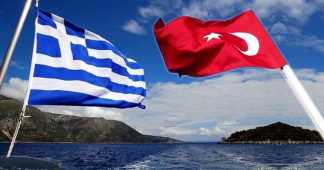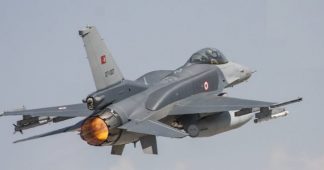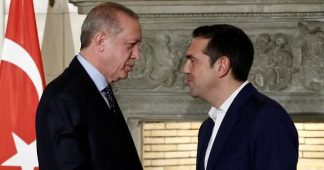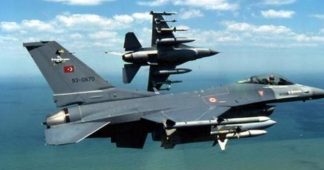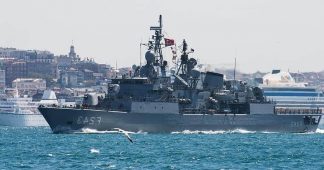by Dimitris Konstantakopoulos
In a previous article we examined the methods third forces may use to provoke a Greek – Turkish military conflict and we explained why such a conflict, if unchecked, has the potential of developing into a disaster for both countries.
We have many indications that there are indeed third forces trying to fuel the conflict, but it is difficult of course to have proofs. This is why we will follow the opposite method. We will try to investigate who will “profit from the crime”, that is by the main international consequences of a Greek-Turkish conflict. By analyzing what can be the results of a full Greek – Turkish war, we can get an idea of the probability international power centers are trying to provoke such a war from behind the scenes.
Of course “war is the Father of everything” and the end – results maybe very different than the intentions. When the Americans organized the coup in Kiev, they were not waiting for the Russian army to land to Syria! Still policies leading to a war are based on pre-war perceptions of what may come as its result. And of course we must keep in mind that if somebody is profiting from a “crime”, that is not a proof he is working to commit it or he has committed it!
Five consequences of a major Greek-Turkish conflict
In case of a major Greek-Turkish war leading to the destruction of both countries, we can already discern five major consequences:
– Erdogan’s regime may be overthrown and replaced by a more amenable, pro-western and pro-Israeli, probably authoritarian regime. The problem of the “independence” tendencies of Turkey will be resolved and Turkey will be very weakened for a very long period.
-Such a conflict will not be only a terrible blow to the Greek and Cypriot states, it will be a terrible blow to the Greek nation itself complementing its historic defeats of 2010 and 2015. This is more important than a blow to the state, because governments and regimes may change, if nations and peoples survive.
Greeks are known for their unusual resistance capacities, from the time of the 1821 Revolution, a lightning in the European night of Holy Alliance to their resistance to the Axis between 1940 and 1945, by far the most combative and massive in all Europe (taking into account the magnitude and the population of the country). The definite neutralization of the Greek nation should be considered a historic triumph of imperial forces wishing to turn all Mediterranean into their “mare nostrum” and expel any Russian or independent European influence for good.
In Greece itself, a military defeat would put in doubt what still remains of something resembling a “parliamentarian democracy”, as for Cyprus it may well mean the end of this state.
Greeks and Greece remain in the consciousness of the world the most important symbol of Man’s struggle for Freedom. The words Freedom, Logos and Democracy were first formulated in the Greek language. The humiliation and ultimate destruction of this nation should be considered a huge ideological triumph for the emerging world totalitarian tendencies.
I understand that some readers may characterize all that as “conspiracy theory”. In that case they should offer an explanation of the fact that Germany, the EU and the IMF did not impose to Greece a harsh neoliberal “reform” program, something “normal” under the circumstances, but what we may call a “nation extinction program”, leading to a 27% loss of GDP, that is to a bigger percentage of GDP loss than German or French GDP losses during WWI. And also to explain why three years later the same forces have attacked and destroyed the banking system of a second state inhabited by a Greek majority, the Republic of Cyprus, by applying an unprecedented “bail-in” program, in reality a kind of financial blietzkrieg.
– Third, a war between Greece and Turkey will constitute a huge and probably mortal blow to the EU, already in deep crisis and not disposing of any tool to face a war situation.
The writer of this article does not have any excessive sympathy for a half – totalitarian, German dominated and anti-social structure like the EU, ruled by an alliance of world financial oligarchy and German elites under NATO and US supervision, which has contributed to the destruction of Greece.
Still the most important question is not so much to destroy or not the EU (or to get one or more states out of it) but how to replace the existing European order with a better one, more social, ecological, democratic and independent.
Under the present circumstances and in the scenario we examine here we run the risk to see extremist forces in the US and some of their allies take advantage of the crisis to try to cut the EU into several, more amenable by the US, pieces, in order to impose their commercial goals to Europe and ensure the unhindered future world domination of the dollar, necessary to assure the financing of US economy
In case of a decomposition of the EU, Neocons may probably try to create a Mediterranean Union comprising South Europe and Northern Africa, not as a tool of cooperation of the various Mediterranean nations, but as a tool of control of them and of deterrence of any outside (Russian, Chinese, German) influence, for the US – Israel axis to have the exclusive control of a Sea in the middle of three continents.
– Any major conflict in the wider Middle East will torpedo the Chinese project “One road, one belt”
– A Greek – Turkish war will be a huge blow to NATO and this is the main and by far the most serious obstacle to a war. But the idea of replacing NATO with other defense structures is floating in Trump’s milieu. If Washington will decide, at some point, that it has to exclude Ankara from the Alliance, then it has to create the possibility to do so, because now it is not possible institutionally and/or politically. But if we speak of a huge crisis leading to the decomposition of the EU, we can then think of NATO’s “recomposition” at least.
From examining the possible consequences of a Greek – Turkish war we can conclude that this is a very radical measure which can be justified only in the eyes of the most radical and extremist forces of the dominant Empire. This is what makes it difficult but not impossible. The over-confidence of Ankara and the chaotic situation in Greek elites can lead to unpredictable situations.
How to avoid a War
During the last year we see accumulating in the Aegean and Eastern Mediterranean sufficient explosive materials.
To propose that those conflicts, with deep roots in history, can just be solved by dialogue between the conflicting parts or by international courts does not seem a viable alternative under today’s conditions. Greece and Turkey are defending positions which are very difficult to breach and if one tries to do it artificially he can have even an opposite result. Those positions are deeply enshrined in the national ideology and mentality of the two countries and it is not very probable that one or both of them is going to retreat from them. Turkey perceives herself too strong to do it, Greece is too weak to do it.
Nowadays Germany is trying to mediate between Greece and Turkey. The problem is that Berlin lacks any great strategic vision (the handling of the Greek crisis during the last decade is more than a proof of that) and a deep understanding of national realities. We cannot also exclude it is probably influenced by its commercial interests.
(By the way it goes without saying than Americans will do everything to torpedo any German role. Trump has already made it plain Foreign leaders ask me to talk to Erdoğan because he only listens to me, Trump says)
One of the main motivations of US policy in the Mediterranean is to forbid any autonomous European role. Some analysts believe one of the reasons Americans encouraged then Turkish PM Ciller to provoke the Imia crisis, in 1996 was exactly to show to both the pro-German Greek PM Simitis and to Europe that they are the bosses in Eastern Mediterranean. One of the reasons Americans and British pushed hard in the past and imposed to Europe the EU enlargement to Turkey, despite the absence of any serious precondition for such a bold move, was their aim to have one more “agent of influence” inside the EU and isolate historic Europe and the EU between Turkey in the East, Britain in the West and Poland in the North).
When foreign powers “mediate” between Greece and Turkey they favor Turkey usually. The reason is simple. Turkish political elites are more independent, more aggressive in pursuing their national interests, much more difficult to handle than usually obedient and dependent Greek political elites. It is only normal, under such circumstances for a mediator to exercise more pressure on the side perceived the weaker and the less resisting.
This method has resulted in the past in bad agreements for Greece, which the Greek elites have accepted because of their dependent character, in spite of opposition by the Greek people and which led finally to more conflict. Washington, London and Athens pushed Archbishop Makarios to sign the notorious Zurich – London agreements on Cyprus (1959) and the only result of those agreements (most probably their purpose also) was to fuel and eternize the conflict between Greek Cypriots and Turkish Cypriots, entrapping them and also Greece and Turkey to an unsolvable Cyprus conflict which lasts until now. It is the same method old colonial powers have used in the Middle East, in the Indian subcontinent and in Africa, in order to stay in those regions after formally “leaving” them, by creating the conditions of all sorts of future conflicts, ready for use by them if they need them. It is the old Roman strategy “Divide et Impera”.
Another example was the notorious and monstrous Annan plan for the solution of the Cyprus problem presented in 2002. This plan which was accepted by Greek and Cypriot political elites and promoted energetically by both US and European powers, provided for the dissolution of the Republic of Cyprus into a kind of “state” where all the important decisions would be taken by three judges appointed by the Secretary General of the UN (that is by the US, Britain and Israel) who would appoint their successors! The plan was counter to all fundamental provisions of Constitutional, European and International Law, a recipe for disaster between Greek Cypriots and Turkish Cypriots and a time bomb inside the EU. Fortunately its architects, conscious of the deep offense for the very foundations of democratic principles represented by their plan and also full of contempt for the simple people provided for a referendum and they gave to the Cypriot people the possibility to reject massively the plan in 2004. By their No vote they made the economy of a huge crisis in Eastern Mediterranean and inside the EU planned already from that time.
The only viable solution
Under the circumstances there seems to be only one solution which preserves the interests of peace, of both the conflicting sides and of Europe, China and Russia in the region. And this is an indefinite moratorium on activities in the area between Greece, Cyprus and Turkey (Cyprus can also be included, but the situation is more complicated there).
The EastMed pipeline may be included in this moratorium, or not. Anyway it will not be constructed. No one of the conflicting sides should be forced to make concessions on its sovereignty rights. No one should be forced into a loss of prestige and face. If the problem of the delineation of maritime zones cannot be solved peacefully now, let it wait for better times. The Caspian model of settlement of maritime disputes can also probably provide for useful ideas.
Otherwise, if we let the crisis escalate, even if we avoid a war now, we will create conditions for future conflicts and for huge future interventions by foreign powers.
24.8.2020
A Note on Entropy and Chaos
There is too much entropy in the world system and it is increasing every day as we approach the US election, where two tendencies inside the western establishment and probably inside the “Empire of Finance” will confront each other. On the one hand you have the representatives of a decaying neoliberal capitalist order, unable to satisfy any social need, defending “disaster capitalism” and its ethos and unable, up to now, to produce a reformist vision of the kind Roosevelt or European capitalism after WWII have produced. On the other hand you have forces which are creating or supporting various demagogues, who are using the huge dissatisfaction, the fear and the anger produced by the crisis, to replace the existing order with an even worse, by intensifying all kinds of social, economic, ecological and military wars and conflicts, trying to kill hope and any sense of meaning in Human History, any belief to Humanism and Rationalism. Both factions have one characteristic in common. They try, by different methods, to preserve and expand the rule of the Big Finance upon humanity.
No third force, with a credible and positive vision for overcoming what is the most serious crisis in the history of Humans has appeared, the struggle of those two tendencies tends to polarize all other players in the world.
There is a growing temptation to provoke events that will help one or the other faction. Those forces which are counting to Trump’s presence in the White House have also a motivation to act now.
The Chaos in the world system is not an accident. It is the “answer” of at least a part of the system to its impasse. To give one example, the extremist “neocon” tendency in the western and Israeli system cannot use a frontal attack on China or Russia, even against Iran it will be problematic, whose rise is threatening potentially western domination on the planet and Israeli domination in the Middle East. It has to resort to all sorts of other means, including Chaos strategies. It is not enough for them to just hope markets and globalization will be enough by themselves to solve the problem of the rise of China, of the reemergence of Russia and other players by undermining their regimes and obliging them to succumb to the rule of Financial Globalization.
